
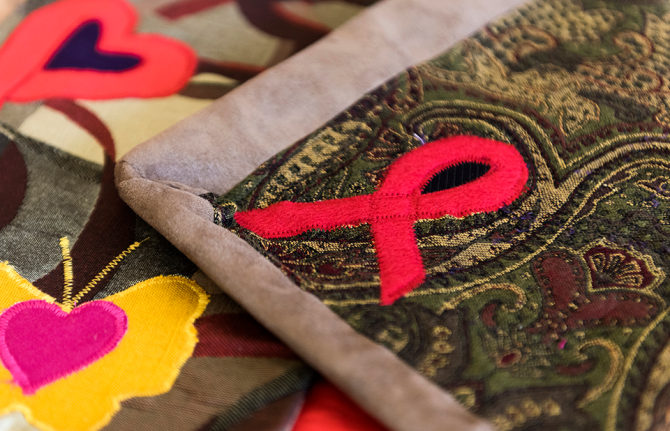
Press Release
UNAIDS welcomes the announcement that Spain will be making a new € 1 million contribution to UNAIDS
06 January 2023 06 January 2023GENEVA, 6 January 2023—Spain’s Ministry of Health has officially announced € 1 million to support UNAIDS’ work on ending AIDS by 2030 as part of the Sustainable Development Goals.
“We warmly welcome Spain’s renewed political, technical and financial leadership at this critical time,” said Winnie Byanyima, Executive Director of UNAIDS. “We look forward to continuing the partnership with Spain to end AIDS both within the country and around the world and tackle the inequalities that continue to drive the pandemic. We strongly commend Spain for its actions and encourage more partners to become funders to the Joint Programme.”
In May 2022, the Ms Byanyima visited Spain to meet with the Minister of Health Carolina Darias who praised UNAIDS on its leadership and coordinating role in the global fight to end AIDS. She stressed that the response to HIV remains a top priority and that Spain would look at ways in which it could increase support to global efforts.
In recent weeks, a series of donors, including the UK, Australia and the Netherlands have announced funding commitments and multi-year agreements to UNAIDS to fill the funding gap which was discussed at UNAIDS Programme Coordinating Board meeting held in Chiang Mai, Thailand in December 2022.
“Spain is walking the talk by taking an important step to become a donor again and help UNAIDS to deliver on the Global AIDS Strategy 2021-2026, we congratulate Spain on its efforts and renewed commitment to UNAIDS,” said Ms Byanyima.
UNAIDS has led the global AIDS response since 1996, positioning, defining and scaling up the response to HIV by providing the quality data on the HIV pandemic, calling for action, fostering dialogue and ensuring that communities most affected by HIV have a seat at the decision-making table.
Minister Darias expressed the Spanish Government's commitment, together with UNAIDS, to end AIDS as a public health threat by 2030, as well eliminating stigma and discrimination against people living with and affected by HIV. She also reaffirmed that ending AIDS will be a priority issue during the next Spanish Presidency of the Council of the European Union in the second half of 2023.
UNAIDS looks forward to continuing to build the partnership with Spain to remove all forms of discrimination and ensure an effective response to HIV, based on evidence and grounded in human rights.
UNAIDS
The Joint United Nations Programme on HIV/AIDS (UNAIDS) leads and inspires the world to achieve its shared vision of zero new HIV infections, zero discrimination and zero AIDS-related deaths. UNAIDS unites the efforts of 11 UN organizations—UNHCR, UNICEF, WFP, UNDP, UNFPA, UNODC, UN Women, ILO, UNESCO, WHO and the World Bank—and works closely with global and national partners towards ending the AIDS epidemic by 2030 as part of the Sustainable Development Goals. Learn more at unaids.org and connect with us on Facebook, Twitter, Instagram and YouTube.
Region/country

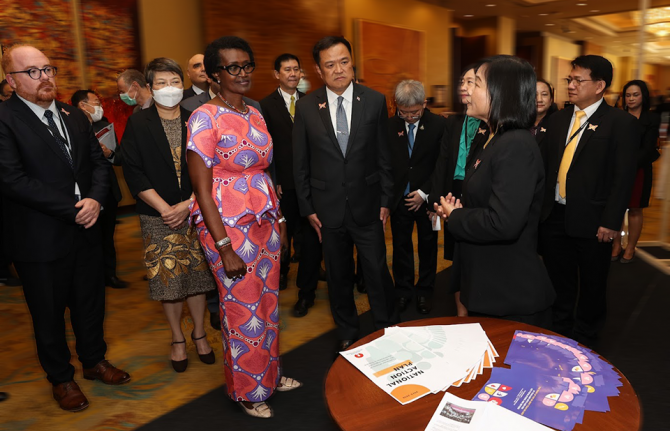
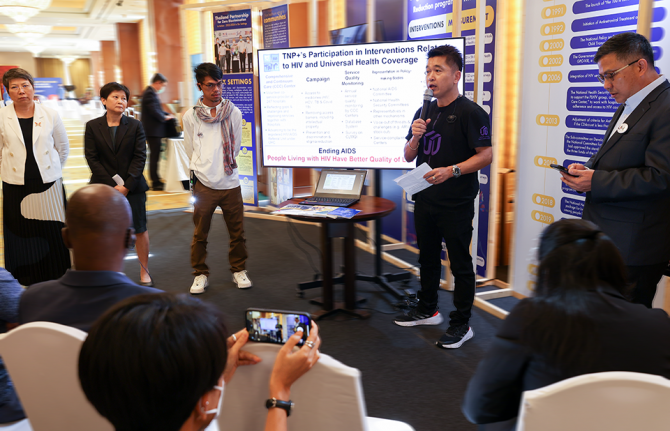
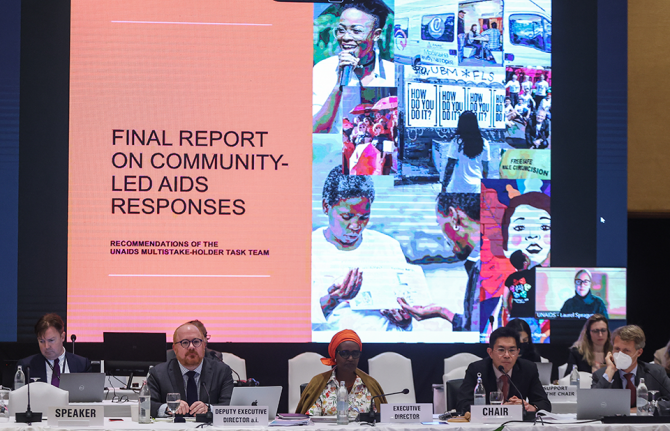
Press Release
UNAIDS Board members commit to bold action to ensure the end of AIDS
16 December 2022 16 December 2022The 51st meeting of the UNAIDS Programme Coordinating Board concluded today, with commitments to bold action to get the world on track to end AIDS by 2030. The meeting, which brings together member states, civil society and UN agencies, saw a series of pledges made and agreements for joint work which will tackle the inequalities which drive the AIDS pandemic.
“The meeting this week has made vital steps forward – on resourcing, on communities, and on inequalities. Delegates have committed to fully fund the AIDS response, to support community leadership, to amplify the message of U=U (Undetectable=Untransmittable), to fight stigma and discrimination, and to support education, empowerment and Comprehensive Sexuality Education. By turning the commitments made this week into action, we can get the world on track to end AIDS by 2030,” remarked UNAIDS Executive Director Winnie Byanyima. “We cannot fail. Failing means people die. Together we must win. By ensuring that communities are empowered and included, that inequalities are tackled, and that the HIV response is fully resourced, this generation of leaders can be leaders who overcome the AIDS pandemic.”
The Programme Coordinating Board noted that a fully funded and staffed UNAIDS is essential for progress to end AIDS. As the NGO Delegation put it, “Survival is at stake, real lives are at stake, we need your support now, not later.” Several donor countries including the UK and Ireland announced that they were stepping up their financial contributions. Donor countries stated their intention to shift towards providing more predictable longer-term funding through multiyear commitments. Delegates also committed to support fundraising from new donors from across sectors. Board members welcomed the recommendations of the report of the PCB Bureau based on the recommendations of the Informal Multistakeholder Task Team on the UNAIDS Funding Situation which can ensure full funding for UNAIDS.
“It was so encouraging to see the commitment of delegates to finding the money that is needed for UNAIDS work to lead global efforts to end AIDS,” said the Chair of the Programme Coordinating Board, Thailand’s Deputy Prime Minister and Minister of Public Health, Anutin Charnvirakul. “With global crises and unaddressed inequalities having put the AIDS response in danger, the world cannot risk a situation in which the UNAIDS Joint Programme is underfunded. Fully funding the vital integrated work of the secretariat and the 11 co-sponsoring agencies that provides the data, advances the essential policy shifts, and lifts up the voices of communities, will save lives and help end the world’s deadliest pandemic. Delegates spoke up powerfully and in no uncertain terms. In 2023 we are all committed to ensuring UNAIDS has the resources the world needs it to have.”
The meeting saw the first international definition of a community-led response to a pandemic, published after a two-year consultative process that brought together 11 governments, representing each region of the world, and 11 civil society representatives. Using the new definitions and recommendations, Minister of Health of Germany, Professor Dr. Karl Lauterbach and the UNAIDS Executive Director Winnie Byanyima published an article in The Lancet calling for inclusion of comprehensive “community pandemic infrastructure” in pandemic prevention, preparedness and response in new planning, international agreements, and financing.
Organisations of people living with HIV presented, through the report of the representative of the PCB NGO, vital findings on the importance of amplifying the message of “U=U” or “Undetectable = Untransmittable”, that people living with HIV who achieve and maintain an undetectable viral load, cannot transmit HIV sexually. They shared how communicating this important information widely helps to increase testing and treatment and also helps to combat the stigma that people living with HIV face. Their call to step up amplification of the U=U message won wide support from delegates.
There was endorsement for the work of the Global Partnership for Action to end all forms of HIV-related stigma and discrimination, which has now expanded to include 33 countries. There was praise for Barbados which this week became the most recent country to end the criminalization of same sex relationships.
Considering the power of education to tackle gender inequality and help prevent HIV transmission, the PCB endorsed the call for an integrated, multisectoral and coordinated HIV response. They endorsed initiatives such as Education Plus, positioning schools as an entry point to address learners’ holistic education, health and protection needs, and backed cross-sectoral collaboration across ministries, families, teachers, school administration and local communities to safeguard rights. They recognised the need for alternative mechanisms to address the needs of young people who are out of school, and the importance of UNAIDS’ support for countries to scale up their comprehensive sexuality education.
The meeting highlighted unacceptable gaps in access to HIV services, including through a thematic segment on how to tackle the current poor performance against global HIV targets among men. A wide-ranging panel showcased innovative approaches to engaging men in all their diversity, finding ways to overcome the harmful gender norms that hold back progress, which will be crucial to achieve the 2030 goal of ending AIDS.
The meeting was held in Chiang Mai, Thailand – the first time in 14 years that the UNAIDS Programme Coordinating Board has met outside of Geneva, an important shift bringing decision-making closer to the communities most affected. Delegates visited pioneering community-led and public programmes that are helping Thailand to tackle HIV, including learning why and how Thailand is shifting from a punitive to a harm reduction approach to help reduce the risks of HIV infection and other risks for people who inject drugs. They also saw how faith communities are being engaged in work to tackle the stigma faced by LGBT people. Thailand has dramatically reduced new infections through this inclusive approach.
“Thailand has been able to show the world key lessons we have learnt in the AIDS response,” said UNAIDS Country Director for Thailand, Patchara Benjarattanaporn, “including by empowering and supporting communities to lead, decriminalising marginalised communities and tackling stigma. Thailand has also been inspired by lessons from around the world and has been reenergised to ensure that we complete the work of ending AIDS by 2030.”
For its 2023 leadership, the Board elected Germany as Chair, Kenya as Vice-chair and Brazil as Rapporteur and approved the composition of the PCB NGO Delegation for next year. In a video message to the Programme Coordinating Board, Professor Dr. Karl Lauterbach, Minister of Health, Germany, remarked: “Challenging tasks lie ahead of us, but I am confident that collectively we will be able to address them effectively in 2023. For the sake of those we have lost to AIDS over the decades, for the sake of the millions of people living with the virus, for the sake of communities and countries affected, and for the sake of those people – mostly young people – that we can prevent from getting infected, let us uphold our joint commitment to end AIDS as a public health threat by 2030 and let us work together.”
UNAIDS
The Joint United Nations Programme on HIV/AIDS (UNAIDS) leads and inspires the world to achieve its shared vision of zero new HIV infections, zero discrimination and zero AIDS-related deaths. UNAIDS unites the efforts of 11 UN organizations—UNHCR, UNICEF, WFP, UNDP, UNFPA, UNODC, UN Women, ILO, UNESCO, WHO and the World Bank—and works closely with global and national partners towards ending the AIDS epidemic by 2030 as part of the Sustainable Development Goals. Learn more at unaids.org and connect with us on Facebook, Twitter, Instagram and YouTube.
Resources

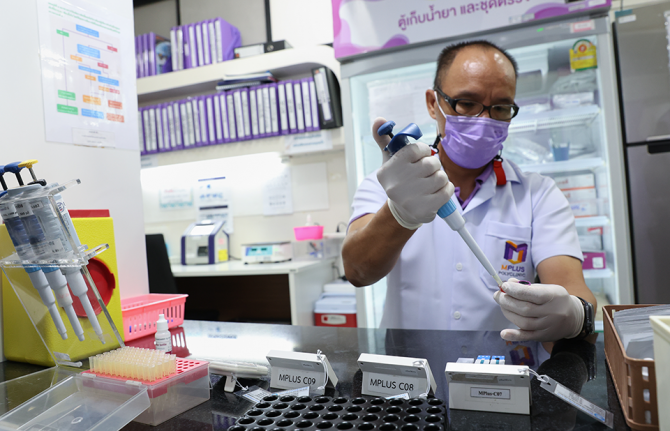

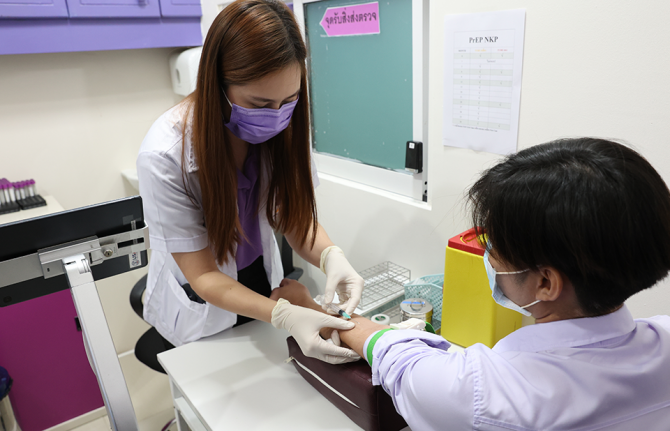
Press Release
Pandemics can only be defeated if communities are supported to lead, say governments, NGOs and UN
15 December 2022 15 December 2022CHIANG MAI, THAILAND, 15 December 2022—Community-led responses are a critical part of the AIDS pandemic response, and must be prioritised in resourcing. The approach, set out by governments, civil society organisations and United Nations agencies at an international meeting on AIDS in Chiang Mai, Thailand, will also be key for tackling other pandemics and for preparing for the pandemics to come, delegates said. The meeting saw the first international definition of a community-led response to a pandemic, published after a two-year consultative process that brought together 11 governments, representing each region of the world, and 11 civil society representatives. This UNAIDS multi-stakeholder task team on community-led responses was co-convened by the World Health Organization and United Nations Development Programme, and presented outcomes to the 51st Programme Coordinating Board meeting of the UN Joint Programme on HIV and AIDS.
Using the new definitions and recommendations, German Federal Health Minister Prof. Karl Lauterbach and the UNAIDS Executive Director Winnie Byanyima published an article in The Lancet today calling for inclusion of comprehensive “community pandemic infrastructure” in pandemic prevention, preparedness and response in new planning, international agreements, and financing. In it, the leaders show that strong community infrastructure, working synergistically with government, is a necessary but neglected element of effective pandemic prevention, preparedness, and response. Using evidence from AIDS, mpox, COVID-19, and Ebola, the authors describe how community-led organisations bring trust, communications channels, and reach to marginalised groups that complement government roles and improve equity.
The new international definitions and recommendations can help planners and funders for AIDS and other pandemics identify the elements of an effective community response. Community-led organizations, defined as "groups and networks, whether formally or informally organized ... for which the majority of governance, leadership, staff, spokespeople, membership and volunteers, reflect and represent the experiences, perspectives, and voices of their constituencies and who have transparent mechanisms of accountability to their constituencies,” form a backbone of that response. Crucially, it is noted that "not all community-based organizations are community-led.”
"While what is most often understood as infrastructure – like labs and hospitals – are important, also essential to effective pandemic response is the community infrastructure which includes people to do outreach, trusted voices who can speak to excluded communities, independent accountability mechanisms, and participation in decision-making,” explained Dr Matthew Kavanagh, UNAIDS Deputy Executive a.i for Policy, Advocacy and Knowledge. “This task team of governments, civil society, and international organizations has given important new tools to support the building and monitoring of community-led capacity. We will only be able to end AIDS and stop other pandemics by ensuring that this community infrastructure is intentionally enabled, strengthened, monitored, and resourced.”
The United Nations Joint Programme on HIV/ AIDS (UNAIDS) Board meeting in Chiang Mai included dialogue between member states and non-state participants on how to develop laws and policies to facilitate community-led response. The recommendations of the multistakeholder task team include developing better systems for financing community-led organisations, which often face legal, capacity, and eligibility barriers to national and international financing mechanisms; monitoring community-led capacity; and integrating data generated by community groups into response management.
To end the AIDS pandemic, board members pointed out, community responses to HIV must be integrated into all levels of countries’ AIDS strategies including planning, budgeting, implementation, monitoring and evaluation.
The principles developed apply not only to AIDS. "Stopping COVID-19, mpox, and Ebola, and preparing for the next pandemic, all require that partnership of government and community together. The newly agreed framework for defining and measuring community-led responses make us better equipped to address the inequalities that are holding back progress in ending AIDS,” said Dr Kavanagh.
In Thailand, as delegates saw for themselves first hand, key-population-led health services have reached people at increased risk of HIV, achieving among the most equitable HIV responses in the region. In South Africa, community leaders with Ritshidze, which represents people living with HIV, visit clinics and communities to assess COVID-19, HIV, and tuberculosis services and hold administrators accountable for addressing issues such as long waiting times or confidentiality gaps that keep some people away from health services. Amid war, Ukraine’s 100% Life, a network of people living with HIV, has used peer networks to communicate with displaced people, delivering medicines, food, and emergency assistance.
"International pandemic agreements and funding should include specific goals for community-led capacity," said Dr Kavanagh. "To be effective, pandemic responses need to move beyond one-way communications to bring communities into decision making at all levels. Community leadership is not mere nice-to-have. It is essential for ending pandemics."
The Lancet article marking the occasion by the German Health Minister and the UNAIDS Executive Director is here.
The report presented at the UNAIDS Programme Coordinating Board meeting is here.
Resources on Community Led Pandemic Response are here.
UNAIDS
The Joint United Nations Programme on HIV/AIDS (UNAIDS) leads and inspires the world to achieve its shared vision of zero new HIV infections, zero discrimination and zero AIDS-related deaths. UNAIDS unites the efforts of 11 UN organizations—UNHCR, UNICEF, WFP, UNDP, UNFPA, UNODC, UN Women, ILO, UNESCO, WHO and the World Bank—and works closely with global and national partners towards ending the AIDS epidemic by 2030 as part of the Sustainable Development Goals. Learn more at unaids.org and connect with us on Facebook, Twitter, Instagram and YouTube.
Our work
Communities make the difference

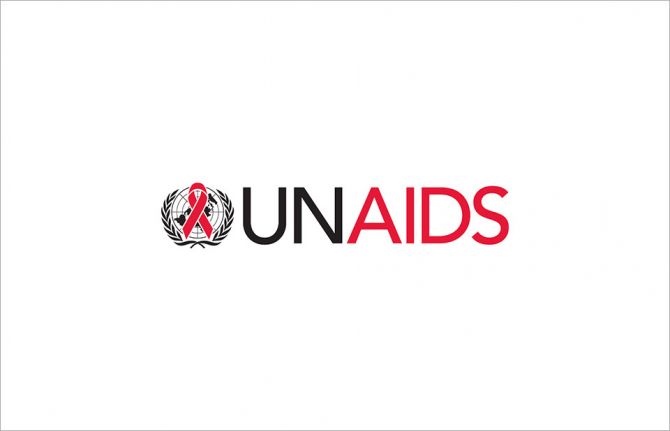
Press Release
Thailand hosts global HIV meeting this week, showcases AIDS response leadership
11 December 2022 11 December 2022BANGKOK, 11 December 2022—The 51st meeting of the UNAIDS Programme Coordinating Board (PCB) will be held from December 13 - 16 in Chiang Mai, Thailand. The meeting is hosted by the Government of Thailand as Chair of the 2022 PCB. It is the first time in 14 years that the board will meet outside Geneva, Switzerland and the second time it will be in Chiang Mai.
“We are grateful to Thailand for its global AIDS response leadership. The country has taken significant strides toward ending its HIV epidemic and is setting an example for the world of translating political will into action,” said Taoufik Bakkali, Director a.i. of the UNAIDS Regional Support Team for Asia and the Pacific.
Hosting this meeting in Thailand helps sustain momentum in the Asia Pacific region to fulfill commitments made by the community of nations in the 2021 political declaration on HIV, Mr. Bakkali said.
The UNAIDS Programme Coordinating Board meeting demonstrates an inclusive approach. Civil society organizations, including associations of people living with HIV, will sit around the table with member states and UN agencies. The attendees will go together to visit and learn from programmes supporting affected people. “This inclusivity is at the heart of the effectiveness of the UNAIDS approach,” said Mr Bakkali. “Increasingly, it is being asked of international processes where are they being held, who is participating, and how is the process connecting with experiences of the most affected people. This meeting is being held in a country which has so many lessons to share from its AIDS response.”
The UNAIDS Programme Coordinating Board provides oversight and strategic direction for the Joint United Nations Programme on HIV and AIDS, which guides and supports the HIV response globally.
The 22nd PCB meeting in 2008 was also held in Chiang Mai under the auspices of former Public Health Minister, Chavarat Charnvirakul. This meeting will be chaired by his son, Deputy Prime Minister and Minister of Public Health, Anutin Charnvirakul.
The Thailand HIV response
There were an estimated 520,000 people living with HIV in 2021.
Thailand has made considerable progress against AIDS, especially in providing life-saving testing and treatment to people living with HIV. The country was first in the region to be validated as having eliminated mother-to-child HIV transmission in 2016. It has also joined the Global Partnership to Eliminate all Forms of HIV-related Stigma and Discrimination.
Since 2010, AIDS-related deaths have declined by almost two-thirds (65%) while new infections fell by 58%. Last year an estimated 94% of people living with HIV in Thailand were aware of their status. Ninety-one percent of diagnosed people were on treatment and 97% of those on treatment achieved viral suppression.
Ahead of the PCB, delegates will learn about notable Thailand HIV response successes. The country has been a trailblazer for integrating HIV services into the Universal Health Coverage scheme. This has become a mechanism for sustainable HIV response financing by significantly increasing investments in key population- and community-led health services.
Thailand has leveraged several best practices to end AIDS, including legalizing over-the-counter sales of HIV self-test kits, scaling up same-day treatment initiation for newly diagnosed people and successfully rolling-out a pre-exposure prophylaxis (PrEP) programme. (PrEP is a daily medicine taken by an HIV negative person to prevent contracting the virus.) Thailand’s focus on public health, and its efforts in tackling stigma and discrimination, have been key to progress made.
“Thailand is on-track to meet and exceed the 2025 95% testing and treatment targets. To do so it must reach those still not accessing HIV prevention, testing, treatment and care services,” said UNAIDS Country Director for Thailand, Patchara Benjarattanaporn. She noted that a key priority now is for Thailand to get people diagnosed earlier and further reduce new infections. Last year there were an estimated 6500 new HIV infections in Thailand. Critically, half of all new infections occur among young people between ages 15 and 24, most of them among people in key population communities.
“Thailand provides excellent HIV services. Unfortunately, too many young people do not get the prevention information, services and support they need. And some people living with HIV become aware of their status late, with already advanced illness. As we work to reach those being left behind, we must address inequalities in access to information, services and support and continue to innovate and scale up effective, community-led approaches,” Ms. Benjarattanaporn said. “Through bold action to tackle inequalities, we can end AIDS by 2030.”
UNAIDS
The Joint United Nations Programme on HIV/AIDS (UNAIDS) leads and inspires the world to achieve its shared vision of zero new HIV infections, zero discrimination and zero AIDS-related deaths. UNAIDS unites the efforts of 11 UN organizations—UNHCR, UNICEF, WFP, UNDP, UNFPA, UNODC, UN Women, ILO, UNESCO, WHO and the World Bank—and works closely with global and national partners towards ending the AIDS epidemic by 2030 as part of the Sustainable Development Goals. Learn more at unaids.org and connect with us on Facebook, Twitter, Instagram and YouTube.

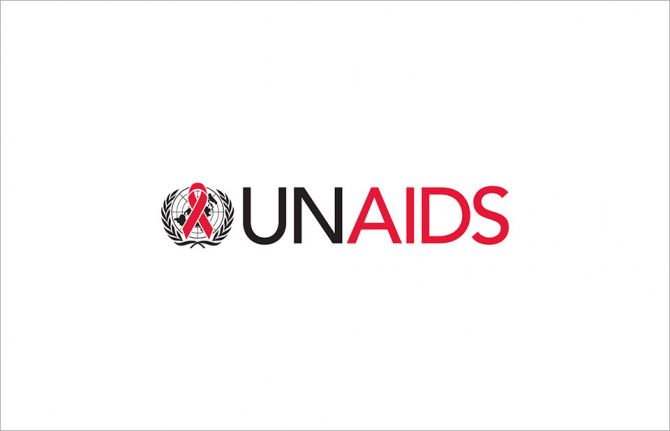
Press Release
Criminalisation has hurt sex workers and perpetuated the AIDS pandemic. UNAIDS welcomes South Africa's call to end it.
04 December 2022 04 December 2022Responding to the decision of South Africa's Cabinet to propose a Bill that will repeal criminalisation of sex work, UNAIDS Country Director Eva Kiwango said:
"The evidence is clear: Criminalisation has been proven to have increased the risks faced by South Africa's sex workers, hurt their health and safety, and obstructed South Africa's HIV response.
UNAIDS welcomes South Africa's Cabinet's proposal to repeal criminalisation and to protect sex workers against abuse and exploitation.
Criminalisation has impeded South African sex workers' access to vital health-care services, including effective HIV prevention, treatment, care and support services.
To end AIDS, we need to repeal the harmful punitive laws which are perpetuating the pandemic. To save lives, decriminalise."
Note: The statement by South Africa's Cabinet on their agreement to propose repeal of criminalisation is published at https://www.gov.za/speeches/statement-cabinet-meeting-30-november-2022-1-dec-2022-0000 under "Criminal Law (Sexual Offences and Related Matters) Amendment Bill of 2022". The Bill will now be published for public comment.
UNAIDS
The Joint United Nations Programme on HIV/AIDS (UNAIDS) leads and inspires the world to achieve its shared vision of zero new HIV infections, zero discrimination and zero AIDS-related deaths. UNAIDS unites the efforts of 11 UN organizations—UNHCR, UNICEF, WFP, UNDP, UNFPA, UNODC, UN Women, ILO, UNESCO, WHO and the World Bank—and works closely with global and national partners towards ending the AIDS epidemic by 2030 as part of the Sustainable Development Goals. Learn more at unaids.org and connect with us on Facebook, Twitter, Instagram and YouTube.
Region/country

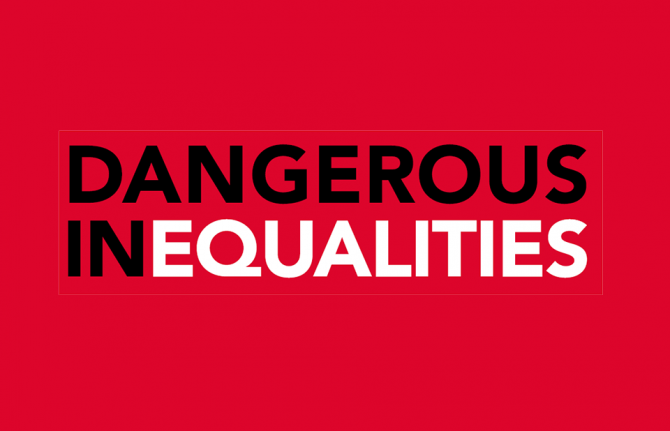
Press Release
Inequalities are blocking the end of the AIDS pandemic, say UN
29 November 2022 29 November 2022DAR ES SALAAM / GENEVA, 29 November 2022—Analysis by the UN ahead of World AIDS Day reveals that inequalities are obstructing the end of AIDS. On current trends the world will not meet agreed global targets on AIDS. But the new UNAIDS report, Dangerous Inequalities, shows that urgent action to tackle inequalities can get the AIDS response on track.
UNAIDS set out earlier this year that the AIDS response is in danger—with rising new infections and continuing deaths in many parts of the world. Now, a new report from UNAIDS shows that inequalities are the underlying reason why. It shows how world leaders can tackle those inequalities, and calls on them to be courageous to follow what the evidence reveals.
Dangerous Inequalities unpacks the impact on the AIDS response of gender inequalities, of inequalities faced by key populations, and of inequalities between children and adults. It sets out how worsening financial constraints are making it more difficult to address those inequalities.
The report shows how gender inequalities and harmful gender norms are holding back the end of the AIDS pandemic.
“The world will not be able to defeat AIDS while reinforcing patriarchy,” said UNAIDS Executive Director Winnie Byanyima. “We need to address the intersecting inequalities women face. In areas of high HIV burden, women subjected to intimate partner violence face up to a 50% higher chance of acquiring HIV. Across 33 countries from 2015-2021 only 41% of married women aged 15-24 could make their own decisions on sexual health. The only effective route map to ending AIDS, achieving the sustainable development goals and ensuring health, rights and shared prosperity, is a feminist route map. Women’s rights organizations and movements are already on the frontlines doing this bold work. Leaders need to support them and learn from them.”
The effects of gender inequalities on women’s HIV risks are especially pronounced in sub- Saharan Africa, where women accounted for 63% of new HIV infections in 2021.
Adolescent girls and young women (aged 15 to 24 years) are three times more likely to acquire HIV than adolescent boys and young men of the same age group in sub-Saharan Africa. The driving factor is power. One study showed that enabling girls to stay in school until they complete secondary education reduces their vulnerability to HIV infection by up to 50%. When this is reinforced with a package of empowerment support, girls’ risks are reduced even further. Leaders need to ensure all girls are in school, are protected from violence which is often normalized including through underage marriages, and have economic pathways that guarantee them a hopeful future.
By interrupting the power dynamics, policies can reduce girls’ vulnerability to HIV.
Harmful masculinities are discouraging men from seeking care. While 80% of women living with HIV were accessing treatment in 2021, only 70% of men were on treatment. Increasing gender- transformative programming in many parts of the world is key to halting the pandemic. Advancing gender equality will benefit everyone.
The report shows that the AIDS response is being held back by inequalities in access to treatment between adults and children. While over three quarters of adults living with HIV are on antiretroviral therapy, just over half of children living with HIV are on the lifesaving medicine. This has had deadly consequences. In 2021, children accounted for only 4% of all people living with HIV but 15% of all AIDS-related deaths. Closing the treatment gap for children will save lives.
Discrimination against, stigmatization and criminalization of key populations are costing lives and preventing the world from achieving agreed AIDS targets.
New analysis shows no significant decline in new infections among gay men and other men who have sex with men in both the western and central Africa and eastern and southern Africa regions. Facing an infectious virus, failure to make progress on key populations undermines the entire AIDS response and helps explain slowing progress.
Around the world, over 68 countries still criminalize same sex sexual relations. Another analysis highlighted in the report found that gay men and other men who have sex with men who live in African countries with the most repressive laws are more than three times less likely to know their HIV status than their counterparts living in countries with the least repressive laws, where progress as far more rapid. Sex workers who live in countries where sex work is criminalized have a 7 times greater chance to be living with HIV than in countries where sex work is legal or partially legalized.
The report shows progress against inequalities is possible and highlights areas where the AIDS response has made remarkable progress. For example, while surveys among key populations often highlight lower service coverage among key populations, three counties in Kenya have achieved higher HIV treatment coverage among female sex workers than among the general population of women (aged 15-49 years). This has been helped by strong HIV programming over many years, including community-led services.
“We know what to do to end inequalities,” said Ms Byanyima. “Ensure that all of our girls are in school, safe and strong. Tackle gender based violence. Support women’s organisations. Promote healthy masculinities—to take the place of the harmful behaviours which exacerbate risks for everyone. Ensure services for children living with HIV reach them and meet their needs, closing the treatment gap so that we end AIDS in children for good. Decriminalize people in same-sex relationships, sex workers, and people who use drugs, and invest in community-led services that enable their inclusion — this will help break down barriers to services and care for millions of people.”
The new report shows donor funding is helping catalyse increased domestic funding: increases in external HIV funding for countries from PEPFAR and the Global Fund during 2018-2021 were correlated with increases in domestic funding from a majority of national governments. New investments to address HIV-related inequalities are urgently needed. At a moment when international solidarity and a surge of funding is most needed, too many high-income countries are cutting back aid for global health. In 2021, funding available for HIV programmes in low- and middle-income countries was US$ 8 billion short. Increasing donor support is vital to getting the AIDS response back on track.
Budgets need to prioritize the health and well-being of all people, especially vulnerable populations that are most affected by HIV-related inequalities. Fiscal space for health investments in low- and middle-income countries needs to be expanded, including through substantial debt cancellation and through progressive taxation. Ending AIDS is far less expensive than not ending AIDS.
In 2021, 650 000 people were lost to AIDS and 1.5 million people newly acquired HIV.
“What world leaders need to do is crystal clear,” said Ms Byanyima. “In one word: Equalize. Equalize access to rights, equalize access to services, equalize access to the best science and medicine. Equalizing will not only help the marginalised. It will help everyone.”
WATCH REPORT LAUNCH
UNAIDS
The Joint United Nations Programme on HIV/AIDS (UNAIDS) leads and inspires the world to achieve its shared vision of zero new HIV infections, zero discrimination and zero AIDS-related deaths. UNAIDS unites the efforts of 11 UN organizations—UNHCR, UNICEF, WFP, UNDP, UNFPA, UNODC, UN Women, ILO, UNESCO, WHO and the World Bank—and works closely with global and national partners towards ending the AIDS epidemic by 2030 as part of the Sustainable Development Goals. Learn more at unaids.org and connect with us on Facebook, Twitter, Instagram and YouTube.

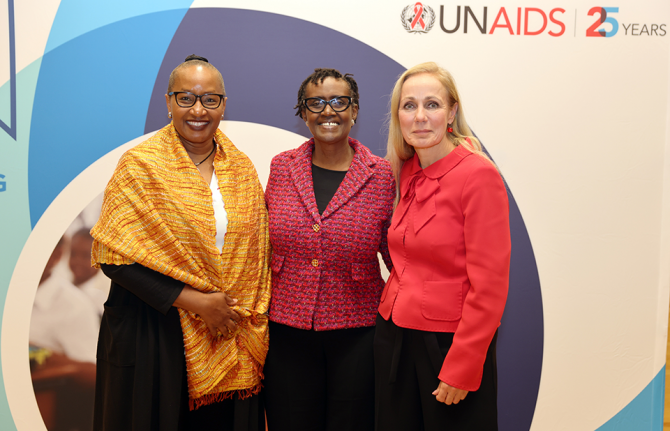
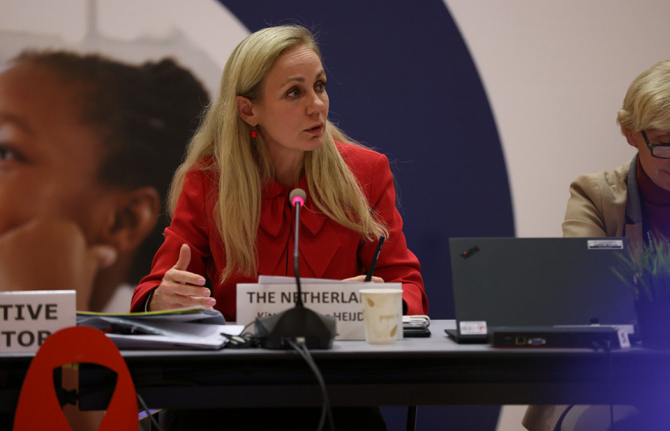
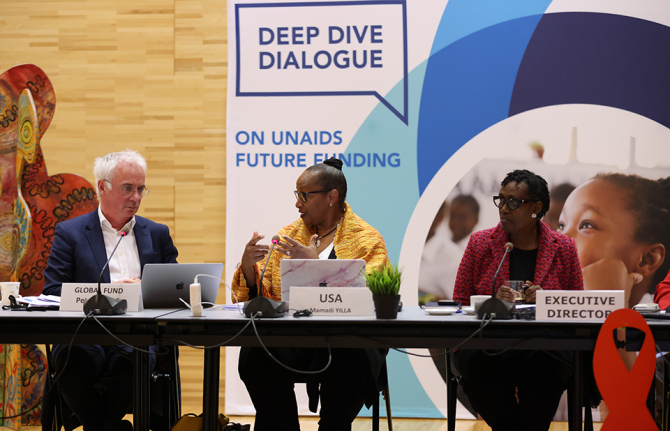
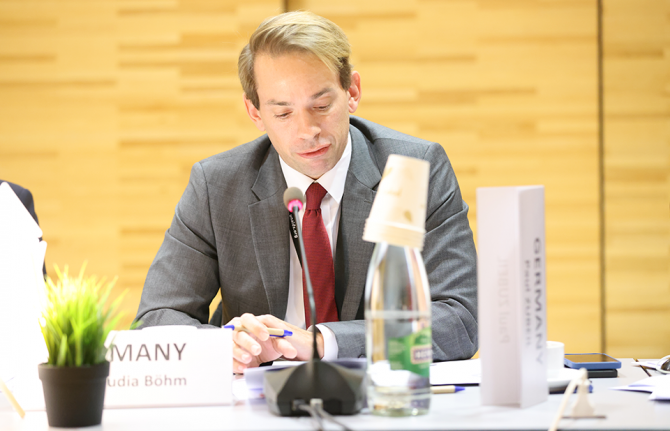
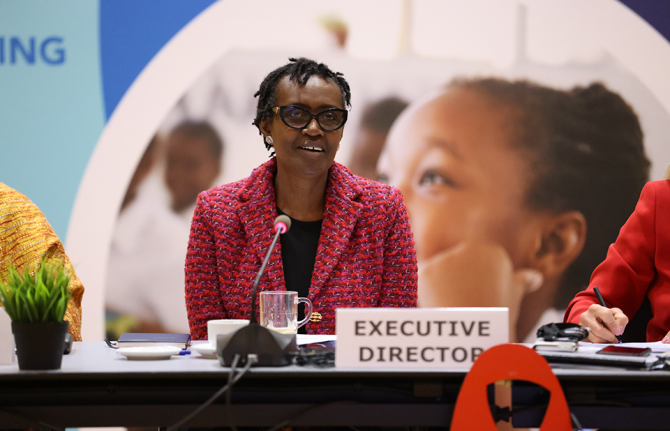
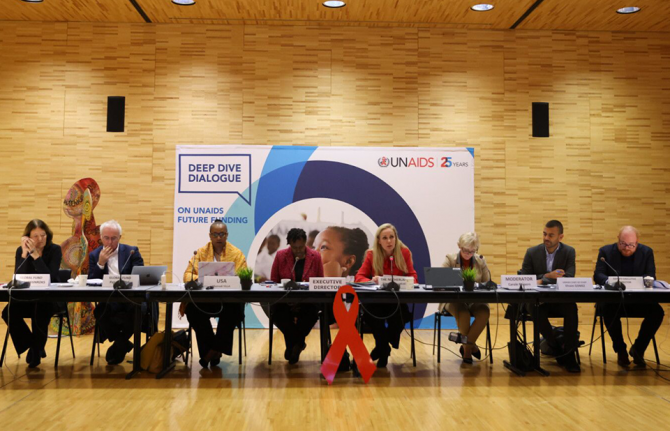
Press Release
Governments step up to close the resource gap for UNAIDS work to end AIDS by 2030
18 November 2022 18 November 2022GENEVA, 18 November 2022—Major donors today announced funding increases to support UNAIDS’ evidence driven, human rights-based work to end AIDS. During a deep dive dialogue at UNAIDS global centre in Geneva the Netherlands and Germany announced additional resources for UNAIDS, in addition to resources already pledged.
Germany announced an additional € 0.5 million, and the Netherlands pledged an additional € 3 million and announced an increase in funding of 15% and a multi-year agreement with UNAIDS to secure funding for 2023-2025.
“Having a fully funded UNAIDS matters because AIDS is still an epidemic for which there is no vaccine and no cure, but it is an epidemic we can treat. It is an epidemic which affects the most vulnerable, the most marginalized, the most oppressed, that’s where UNAIDS plays a pivotal role,” said Kitty van der Heijden, Vice Minister for Development Cooperation of the Netherlands. “UNAIDS needs to be enabled to deliver what it does well, and that is helping to prevent and treat HIV—we encourage more donors to come forward.”
In July UNAIDS released a report showing that the response was in danger, with the COVID crisis and the war in Ukraine putting the AIDS response under even greater strain. In 2021, one person died every minute of an AIDS related illness and every two minutes a young woman became newly infected with HIV.
“AIDS remains a deadly pandemic and we cannot afford to pause now,” said Winnie Byanyima, Executive Director of UNAIDS. “UNAIDS has developed a strategy that will put us on a path to end AIDS, saving the lives of millions of people, ending inequalities that drive pandemics and building stronger health systems, but we need funding to make it happen. We welcome the additional pledges of support to UNAIDS which will bolster our efforts to get across the finish line.”
UNAIDS is working with its 11 Cosponsoring organizations, combining the range of technical expertise, cross-sectoral work and political reach that is needed to get the response back on track. A fully funded UNAIDS is critical. Investment now is essential to achieving the 2030 target of ending AIDS. A failure to invest will prolong the epidemic indefinitely with soaring costs in the future if we don’t act now.
UNAIDS
The Joint United Nations Programme on HIV/AIDS (UNAIDS) leads and inspires the world to achieve its shared vision of zero new HIV infections, zero discrimination and zero AIDS-related deaths. UNAIDS unites the efforts of 11 UN organizations—UNHCR, UNICEF, WFP, UNDP, UNFPA, UNODC, UN Women, ILO, UNESCO, WHO and the World Bank—and works closely with global and national partners towards ending the AIDS epidemic by 2030 as part of the Sustainable Development Goals. Learn more at unaids.org and connect with us on Facebook, Twitter, Instagram and YouTube.

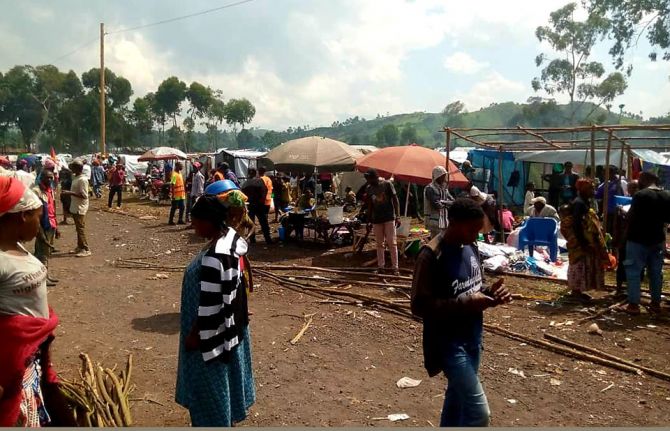
Press Release
UNAIDS is deeply concerned that rising violence in the Democratic Republic of Congo threatens HIV treatment and prevention services
02 November 2022 02 November 2022GENEVA/KINSHASA, 2 November 2022—UNAIDS is alarmed that fighting between government forces and rebels in the east of the Democratic Republic of Congo is causing serious disruption and harm to treatment, prevention and care services for people living with and affected by HIV.
In the health zones of Rutshuru and Rwanguba where some of the heaviest fighting has been reported, the AIDS Control Programme (PNLS) in North Kivu has registered 1155 people living with HIV currently on treatment including 102 pregnant women and 46 children. As the violence has escalated, large numbers of people have fled these areas in the past few days, most of them south towards Goma.
“I am extremely worried about the health and well-being of people living with and affected by HIV both in the areas affected by the fighting and in communities hosting those who have been displaced. People may have had to leave their homes at a moment’s notice without time to pick up essential medicines,” said UNAIDS country director, Susan Kasedde. “I am especially concerned about the situation of pregnant and breastfeeding mothers living with HIV and their babies. The interruption to treatment for these mothers will have catastrophic implications for their infants. It is a race against time and we must do everything possible to find these women urgently and link them to care.”
UNAIDS is working closely with national HIV programme managers, civil society groups, community organizations and all partners to support an emergency response to the current situation.
The following activities are being conducted as a priority:
- Verifying the numbers of people living with HIV currently on treatment to inform needs and planning going forward in the affected communities of Rutshuru and Rwanguba and in the host communities
- Conducting an assessment with humanitarian partners to enable the integration of HIV-related services into the joint response. This includes working with partner United Nations agencies including UNOCHA, UNICEF, WFP, UNFPA and UNHCR to gather information from civil society organizations to understand needs and capacities both in conflict-affected areas and communities hosting displaced people
- Rebuilding community support networks by contacting focal points of civil society organizations, community organizations such as mentor mothers, and service providers to establish a network with the capacity to help track and trace people living with HIV and to support the continuity of HIV services for them, including psycho-social services for victims of gender-based violence, and nutritional support to enable HIV treatment to be taken
- Supporting community-level efforts to ensure more effective messaging for people living with HIV and related to the protection of the rights of people living with HIV. UNAIDS is also conducting ongoing advocacy to strengthen the integration of HIV needs into the emergency response.
UNAIDS fully supports calls for the immediate cessation of hostilities made by the United Nations Secretary General, Antonio Guterres, and by the African Union.
UNAIDS
The Joint United Nations Programme on HIV/AIDS (UNAIDS) leads and inspires the world to achieve its shared vision of zero new HIV infections, zero discrimination and zero AIDS-related deaths. UNAIDS unites the efforts of 11 UN organizations—UNHCR, UNICEF, WFP, UNDP, UNFPA, UNODC, UN Women, ILO, UNESCO, WHO and the World Bank—and works closely with global and national partners towards ending the AIDS epidemic by 2030 as part of the Sustainable Development Goals. Learn more at unaids.org and connect with us on Facebook, Twitter, Instagram and YouTube.


Press Release
UNAIDS warns that HIV, COVID and other health investments are in danger due to a looming debt crisis in Africa and the developing world
13 October 2022 13 October 2022In 2020 highly indebted countries already used four times more of their revenues on debt repayments than on health investments, reveals UNAIDS report A Pandemic Triad. The report was presented at an event hosted by Georgetown University in Washington DC during the Annual meetings of the International Monetary Fund (IMF) and the World Bank
WASHINGTON/GENEVA, 13 October 2022—COVID-19 and the debt crisis, now aggravated by the consequences of the war in Ukraine, have created an unprecedented setback in global health, and put the global response to AIDS in jeopardy, risking 7.7 million deaths to AIDS-related causes by 2030, according to a new report by UNAIDS.
The report, A Pandemic Triad, shows that the debt crisis and the war in Ukraine have deepened the fiscal crisis of developing countries, severely undermining their capacity to invest in health. It also shows that the countries most affected in economic terms by COVID-19 are the countries deepest in debt—they are also the countries most affected by HIV. In 2020, for every US$ 10 available, US$ 4 was spent on debt servicing and only US$ 1 was invested in health.
“The multilateral system cannot fail again,” said Winnie Byanyima, Executive Director of UNAIDS. “The response to COVID was dramatically inadequate, from very limited vaccination in developing countries to no permanent debt relief, and scarce fresh resources to countries with severe health and social problems—there can be no mistakes this time.”
The World Bank is forecasting that, without even including the latest numbers, 110 countries will have health spending in 2027 either under 2019 levels or slightly over, with only 67 countries. going above 2019 pre-COVID health investment levels.
The 2020 data show that there was a temporary increase in health spending, but it was focused predominately on the COVID emergency, leaving other health priorities behind. Latest forecasts from the IMF predict slower economic growth, higher inflation and worsening debt risks, leaving health and HIV investments under severe threat.
“We need a brave multilateral response to enable developing countries to respond to current pandemics and prevent future ones, while tackling the urgent food crises,” said Ms Byanyima. “Growing development cooperation, closing tax loopholes and promoting progressive taxation, providing fast and effective debt cancellation and relief, and avoiding the resource to austerity that would mean less doctors, nurses, midwives, is the way to go. New resources and resources freed from debt or tax dodging should be invested wisely to end AIDS by 2030 and respond effectively to future pandemics.”
A Pandemic Triad shows that of the 38 million people estimated to be living with HIV, 26 million are in developing countries and two thirds are in countries that received absolutely no debt relief at all despite the deep health and economic crisis brought by COVID.
The HIV response in low- and middle-income countries is US$ 8 billion short of the amount needed by 2025. In 2021, international resources for HIV were 6% lower than in 2010. It is estimated that the reduced availability of resources to finance access to HIV services could cost 7.7 million lives over the next decade.
The Global Fund to Fight AIDS, Tuberculosis and Malaria is seeking additional resources for countries´ investments in the fight against the three diseases.
Kalipso Chalkidou, Head of Health financing at the Global Fund said, “As the latest IMF World Economic Outlook figures illustrate, the outlook is dire for donor and recipient countries alike, with debt servicing severely constraining especially poorer nations' ability to spend in health and social causes. In this environment, Global Fund views debt swaps for health as a promising tool for creating badly needed fiscal space to invest in health systems and the three diseases."
On average, public debt levels in low- and middle-income countries rose from 55% to 63.8% of GDP between 2019 and 2020 equivalent to a staggering US$ 2.3 trillion and continue spiraling. Meanwhile currency depreciation to the US dollar of over 10%, and escalating interest rates payments are creating a perfect debt storm. For low-income countries (LICs), total debt is estimated at 87% of GDP. As a consequence, the proportion of LICs in debt distress, or at high risk of debt distress, has doubled to 60% from 2015 levels.
OXFAM presented the update of the commitment to Reduce Inequality Index at the Annual meetings and presented the latest data around inequalities in access to health.
Max Lawson, Head of Inequality Policy and Advocacy at Oxfam International said, “Our analysis shows that half of the poorest countries cut health spending, despite the worst health crisis in century. They are spending far more on repaying their huge debts to rich creditors in New York and London than they are able to spend on protecting their people from dying from diseases. This is an appalling situation, made more appalling because it does not have to be this way. Inequality is a policy choice, not an inevitability”.
UNAIDS
The Joint United Nations Programme on HIV/AIDS (UNAIDS) leads and inspires the world to achieve its shared vision of zero new HIV infections, zero discrimination and zero AIDS-related deaths. UNAIDS unites the efforts of 11 UN organizations—UNHCR, UNICEF, WFP, UNDP, UNFPA, UNODC, UN Women, ILO, UNESCO, WHO and the World Bank—and works closely with global and national partners towards ending the AIDS epidemic by 2030 as part of the Sustainable Development Goals. Learn more at unaids.org and connect with us on Facebook, Twitter, Instagram and YouTube.

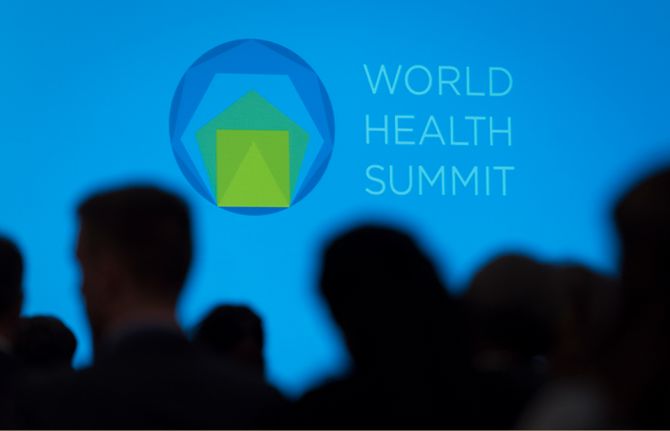
Press Release
On eve of the World Health Summit, UNAIDS urges countries to end the inequalities driving the HIV pandemic and other health threats
14 October 2022 14 October 2022BERLIN/GENEVA, 14 October 2022—As global health leaders arrive in Berlin for the World Health Summit, UNAIDS is calling on countries to challenge the inequalities and injustices that are obstructing efforts to end the HIV pandemic and weakening responses to other health threats.
UNAIDS recent report In Danger, revealed a faltering HIV response in many countries, with entire groups of people being left highly vulnerable to HIV infection and unable to access HIV treatment, prevention and care services. Data included in the report showed that HIV infections are increasing in 38 countries worldwide and that the pandemic continues to have the worst impact on adolescent girls and young women and key populations such as gay men and other men who have sex with men, sex workers, transgender people and people who use drugs.
In 2021, there were 1.5 million new HIV infections worldwide—more than 1 million above the 2020 target. Globally, 250 000 adolescent girls and young women aged 15—24 years old became infected with HIV in 2021, while four out of five new infections among this group occurred in sub-Saharan Africa. Key populations and their sexual partners account for 70% of new HIV infections globally. Meanwhile, almost 10 million of the 38.4 million people living with HIV globally are still waiting for treatment to keep them alive and well and stop them transmitting the virus.
“It’s still possible for countries to end the AIDS pandemic by 2030 but it will require additional investment and a relentless focus on challenging gender-based violence, gender inequalities and other social injustices that make people vulnerable to infection and keep them away from HIV prevention, treatment and care services,” said UNAIDS Executive Director, Winnie Byanyima, who is in Berlin for the summit. “Laws that criminalize and marginalize vulnerable groups of people are denying the right to health to entire groups of people and holding the HIV response back.”
At the summit, UNAIDS will also be underlining the need for high-income countries to continue their support for the global HIV response, especially as the economic crisis bites. Many low- and middle-income countries have cut budgets for health, education and other essential services in the last two years as they deal with the economic fallout of the COVID-19 pandemic and struggle to meet crippling debt repayments to richer nations.
“It would be tragic, misguided and unfair to expect the world’s poorest to pay for the current global economic crisis for which they bear no responsibility,” said Ms Byanyima. “In fact, additional investments in essential services such as health and education are vital now to help low- and middle-income countries weather the storm and emerge as fairer societies contributing to global health security.”
Achieving the goals of the UNAIDS Global AIDS Strategy 2021—2026 requires that annual investments in HIV services in low- and middle-income countries rise to a peak of $29 billion by 2025—there is a current shortfall of around $8 billion. UNAIDS has commended Germany’s pledge of €1.3 billion for the 7th Replenishment of the Global Fund to Fight AIDS, Tuberculosis and Malaria—a 30% increase on its 2019 pledge. Germany has also contributed €6 million to UNAIDS for 2022, making it the organization’s fifth biggest donor.
During the World Health Summit, Ms Byanyima will participate in an event hosted by Germany’s Federal Ministry of Health: The Global Effort to End HIV and AIDS: Addressing Inequalities in the AIDS Response to Make the Money Work. The session will take place on Sunday 16 October between 14:00—15:30 CET and will be livestreamed here.
On Tuesday 18 October between 19:00—21:00 CET Ms Byanyima will be in a livestreamed conversation with the Heinrich Böll Foundation: Lives Before Profits: A conversation with Winnie Byanyima on Global Health Justice.
During her visit to Berlin, Ms Byanyima will also meet with communities and activists involved in the HIV response in Germany including representatives from Aktionsbündnis gegen AIDS, Deutsche AIDS Hilfe and AIDS Action Europe. Discussions will include legal barriers to providing HIV services for all in Germany, ongoing support to Ukrainian refugees and lessons learned from the COVID-19 pandemic.
UNAIDS
The Joint United Nations Programme on HIV/AIDS (UNAIDS) leads and inspires the world to achieve its shared vision of zero new HIV infections, zero discrimination and zero AIDS-related deaths. UNAIDS unites the efforts of 11 UN organizations—UNHCR, UNICEF, WFP, UNDP, UNFPA, UNODC, UN Women, ILO, UNESCO, WHO and the World Bank—and works closely with global and national partners towards ending the AIDS epidemic by 2030 as part of the Sustainable Development Goals. Learn more at unaids.org and connect with us on Facebook, Twitter, Instagram and YouTube.
